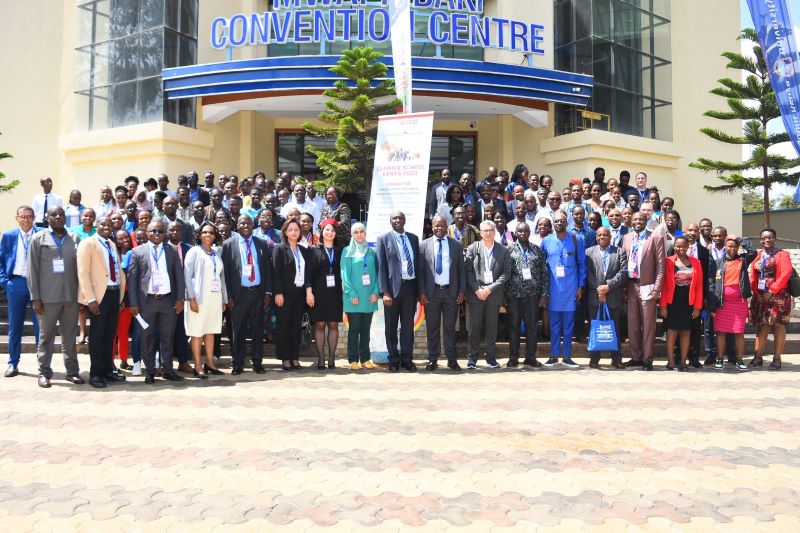
- Version
- Download 5
- File Size 33.97 KB
- File Count 1
- Create Date May 22, 2023
- Last Updated May 22, 2023
CEO National Research Fund
Opening Remarks by Professor Dickson Andala at the opening ceremony of the ACCESS International Summer School Kenya-2023
The Vice-Chancellor, Mount Kenya University, Prof. Deogratius Jaganyi
Prof. Collins Miruka, Director, School of Business and Management Science, Technical University of Kenya
Madam Miranda Pendo, TVET Programme Coordinator, Kenya Association of Manufacturers,
Mr. Stephen Ogenga (MIEEE, FIET-K)-Director General, National Industrial Training Authority, Kenya
Mr. Douglas Kuria, CEO & Managing Director, Neo Kenya Mpya Ltd, Kenya
Mr. Tobias Alando, ACCESS, Advisory Kenya
ACCESS Board Members, Coordinators, and Participants from Benin, Tunisia, Nigeria, Ghana, Rwanda and Germany.
Sponsors and Partners, Members of Industry, Members of Academia, Guests, Ladies and Gentlemen.
It gives me great pleasure to share with you my thoughts and contribution to ACCESS project 2020-2024.
The four pillars of ACCESS, Capacity Building, University Business Linkage, Employability Research, & Entrepreneurship Academy have key strategic orientation towards addressing Kenya’s current unemployment among university students.
Capacity Building:
I challenge the participants during the 3rd International Summer School 2023 to work to seek the support of innovation hubs, and start-ups to promote impact-based training opportunities. We all understand that the digital economy has numerous flexible opportunities for delivering such training opportunities. At times, hybrid models of training ensures that both theoretical and practical concepts are intertwined. Therefore, even as we pursue this, I am aware of the numerous opportunities for funded training not just for faculty but also for students, especially by DAAD, Erasmus+, BMZ, EURAXESS among others. Postgraduate students should be exposed to these numerous opportunities so as to afford them exposure to cultures and skills necessary to function in the modern labour market.
University Business Linkage
I want to acknowledge and appreciate the industries represented today (both attendees and sponsors). It is by strengthening relationships between universities and industry, that we can expand cooperation and knowledge exchange between stakeholders, thus growing new professional opportunities for African students as envisaged by ACCESS Project. These synergies as witnessed through breakfast meetings and service-learning which is being introduced will be central to the development of competent graduates who will not only by competitive buy also idea generators, critical for start-ups, innovation and self-reliance.
Employability Research
In as much as the research pillar yields better resource for the higher education sector, it is my submission that, research should be geared towards impact-based solutions. This is where NRF plays a critical role in supporting competitive applications for research focused on our current national research priorities. I challenge the Kenyan institutions of higher learning to support NRF initiatives in promoting research. I am aware that Mount Kenya University is supporting faculty in this area under the Vice-Chancellors, Research and Innovation grant, and I challenged the university to explore more opportunities for research with NRF and funding agencies that are continuously releasing calls for research activities. Universities should also be encouraged that this is not a one-off activity, but that it can be natured until and institution becomes a centre of excellence in a specific research area. By doing this, we encourage our students and staff to participate employment leading researchers, which will expose them to increased networks and cultures necessary to spur employability prospects.
Entrepreneurship Academy
Under this pillar, I challenge the innovation hubs to reach out to universities and explore ways of partnerships. In as much as this is a two-way approach, both stakeholders should be cognizant that no government in the world will ever meet all the employment needs of its citizens. As a result, entrepreneurship academies such as MKU Graduate Enterprise Academy should continuously innovate its approaches to funding lines and partnerships as a way of promoting sustainable strategies. I challenge the industries present today, an MKU local partner universities (Riara University, Technical University of Kenya) to deepen their ties and reduce on bureaucracies if meaningful engagements are to be realized-this applies to the firms present today.
On behalf of NRF, we will continue supporting research agenda in Kenya as envisaged by the national research priorities and welcome MKU who is our key partner to continue walking the journey with us.
Asanteni Sana.













